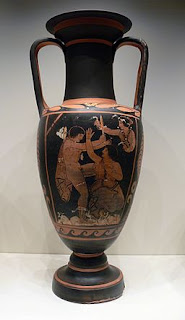[Greek and Trojan women come to tend the grave of Agamemnon, the victorious leader of the Greeks against Troy. This is an excerpt slightly adapted from Agamemnon Must Die, Createspace, Kindle, and Smashwords, 2014. See tab for BOOKS on this site. I offer this here to give some of my attempts at poetry an airing.]
[Bust of Aeschylus who lived in the 6th century B. C., probably from the 4th century B.C. Downloaded from Wikimedia Commons.]
We hail and laud thee, O Agamemnon, king of men.
You who returned victorious from your mighty labors
On the broad plains of Troy as you did from
Your many expeditions to establish
The will of Zeus throughout this land.
O king, we have faithfully maintained your shrine,
As enjoined by Lord Aigisthos and his Lady Clytemnestra.
At every new moon, we have come
To honor your memory with fresh libations,
To sweeten the air with boughs of laurel,
And to sweep away grime and filth, from man or beast,
Or from the wind and the weather, that should foul your memorial
Or tarnish your memory.
We implore you to keep the city safe and the plains fertile!
We beseech you to guard over us against pestilence,
As well as hostile swords and spears.
We pray peace be with your spirit for you have
Made all who live in the Argolid proud.
Hail Agamemnon, king of men!
[The Greek mourners.]
Ou-ai, listen also to our woe for our grief overflows.
We, whose fathers, husbands, lovers, and brothers followed you;
We, who have waited in vain for their return.
Our number is great; those here are but the few
Who have sought the protection of the palace
From hunger and homelessness. No one can protect us
From the gnawing pain of sorrow and loss.
It is not greater than those of our number
Who enjoy the comfort of remaining family.
They suffer still from the anguish of their loss.
But our eyes have grown dim from the tears we have shed.
Our voices have become hoarse from the cries we have raised.
Our hearts have dried up with our hopes and love.
Only these shells remain: bereft, benighted, beyond hope.
Are our fathers, husbands, lovers, and brothers with you?
Do they do you honor as we do? As we must, by command
Of our lord and our lady?
They followed you gladly for love of their king;
[The Trojan mourners.]
Ou-ai, ou-ai, hear us, most fearful king of men,
You who led those myriad ships and men against us.
Foolish Paris gave you your moment and you grasped it.
Hector and Priam loved him too dearly to abandon him.
To what end? Ou-ai, to what end?
Those we loved most dearly, our fathers, husbands, lovers, and brothers—
All fell before your swords and flames.
They made you pay dearly, they did.
Us, you and your men gathered as trophies and war brides.
Fully half of us could not bear the thought of such fate.
They embraced us, then threw themselves
Into Poseidon’s watery clutch.
Fully half of those left among us were sick and lost at sea,
Joining their captors in that briny sepulcher.
Yet another half of those who arrived here
Have since succumbed to taunts, torment, and terror
As prisoners of war. We remain,
We do not deserve better. We have seen how
Those captured before Priam’s walls have fared.
We know the cruelties that Troy visited on those who
Fell into its snares or yielded to its armies.
We who are left of your trophies and able still to walk
Have joined in pouring the libations to you,
King of men, to join in your sorrow
And share in your grief. Know this, that the libations we poured
For you, we have poured also for ourselves.
Ou-ai, ou-ai!
[The image of the vase decorated with a scene from the Oresteia is that of an Italian archaeological find from the 3rd century B. C. downloaded from Wikimedia Commons. The last image is that of the cover of Agamemnon Must Die, 2014. Neither this blog extract nor anything in Agamemnon is translated from Aeschylus' Oresteia. I have used the non-prose form to approximate the "Greek chorus" and given such content as I have felt best conveys what its "message" might be in today's vernacular. Comments invited.]









